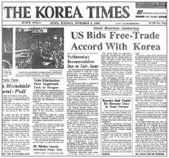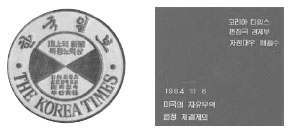|
 Seoul
Reserves Answering Seoul
Reserves Answering
US Bids Free-Trade
Accord With Korea
The Unites States has suggested a free-trade agreement with Korea,
under which the two nations would exempt each other’s goods from
import duties, highly-placed government sources said yesterday.
The duty-free agreement has been a bilateral topic of the Korean
and U.S. economic policymakers, especially since Amb. William E.
Brock, U.S. Trade Representative, raised the issue to Deputy Premier-Economic
Planning Minister Shin Byong-hyun this spring.
The government, however, has reserved its answering to the U.S.
bid, which was expounded privately by Amb. Brock when he visited
Seoul in April to attend an international trade forum.
Officials at the Economic Planning Board (EPB) said: “We can not
give an immediate ‘yes’ or ‘no’ to the free trade proposal due to
its unmeasured sensitivity to the Korean economy as a whole.”
The positive effect of the agreement is the total suspension of
the U.S. protective measures against the Korean products, an enormous
chance to boost Korean exports on the U.S. market.
Increasingly, exports of some Korean products including color
TV sets have hit a snag because of anti-dumping acts and other American
trade protective measures.
However, the duty-free agreement is certain to threaten the survival
of the Korean agricultural industries. A tally shows that Korean
farm products’ prices are three times higher than those of American
goods on average.
For this reason, the government is not expected to enter a duty-free
accord with the United States, the nation’s biggest trade partner,
in the future.
“The unprecedented arrangement, however, deserves Korean consideration
so long as Korea supports the free-trade principle,” said a ranking
official at the EPB, who refused to be identified.
“In particular,” he went on, “it seems desirable for the two nations
to enforce the free-trade arrangement on a gradual basis.”
His remarks may indicate the Korean willingness to negotiate with
the United States on the arrangement on the condition that farm
products and other ‘sensitive’ products are excluded in the list
for free trade.
The United States will soon enter its first duty-free pact with
Israel. To this direction, the U.S. Congress gave final approval
on Oct. 9 to a trade bill. President Ronald Reagan has signed it
into law, authorizing the president to negotiate with Israel the
free-trade arrangement.
Some trade experts predicted that the agreement will be the forerunner
of a series of multilateral duty-free arrangements with other U.S.
trading partners such as Korea, Taiwan and Canada.
U.S. Commerce Secretary Malcolm Baldrige expressed the positive
American stand for the prospective Korea-U.S. free-trade arrangement
for their mutual benefit in the unprecedented teleconference between
Seoul and Washington.

|




